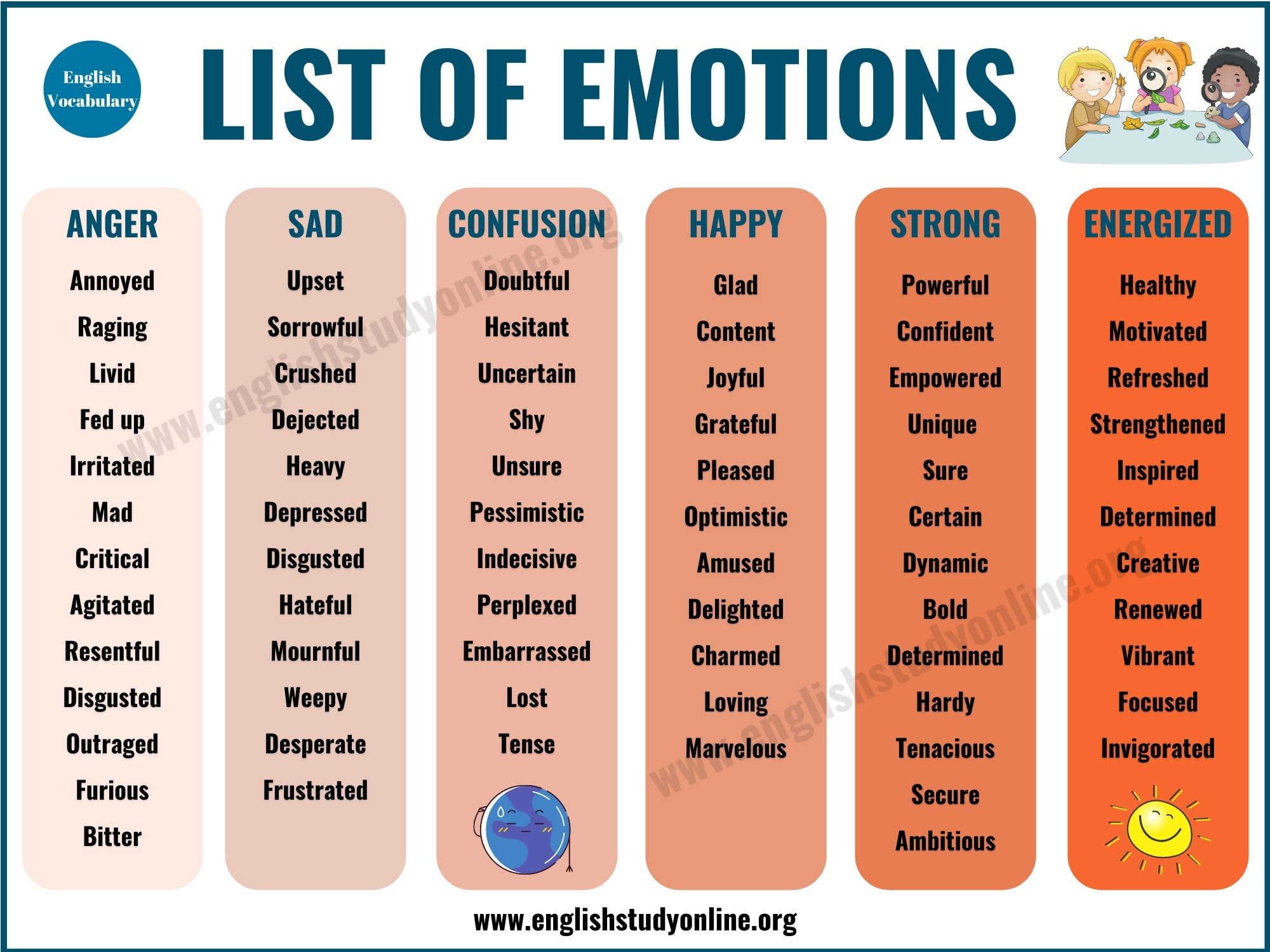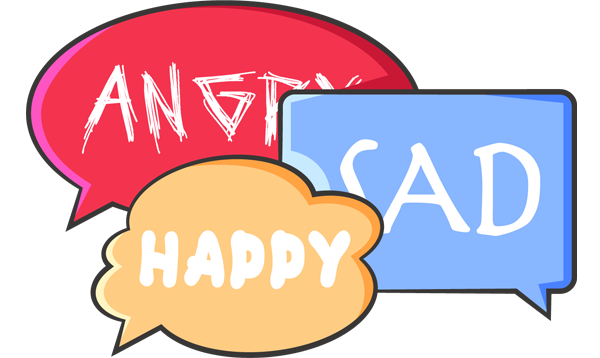Содержание статьи:
- Колесо эмоций от Lindsay Braman
- Базовая лексика: эмоции по-английски
- Про эмоции не английском — средний уровень
- Продвинутая лексика на тему эмоций
- Состояние или эмоция на английском
- Упражнение для закрепления
Сегодня мы дадим вам лексику на тему эмоций. На момент публикации это самая исчерпывающая подборка в интернете. Мы проверили. Даже если у вас высокий уровень, вы наверняка найдете здесь для себя новые слова.
Колесо эмоций от Lindsay Braman
Терапевт и психолог-педагог из США по имени Lindsay Braman составила колесо Emotion Sensation Feeling Wheel, которое должно помочь людям идентифицировать свои эмоции. Часто человеку сложно выразить свои эмоции словами из-за банального неумения разобраться в собственных чувствах. Когда предлагается выбрать из списка слов, становится намного проще.
Изначально это колесо никак не относилось к изучению английского, но мы его возьмем в качестве учебного материала.
Ближе к центру на колесе расположены базовые эмоции:
- Fear – страх
- Anger – злость
- Disgust – отвращение
- Sad – грусть
- Happy – счастье
- Surprise – удивление
Далее, чем дальше от центра, тем более тонкие оттенки эмоций и чувств. Все эти слова, и даже больше, вы найдете в этой подборке. Для удобства мы их разбили по уровням сложности.
Подсказка: Если вы хотите найти слово из колеса в статье, воспользуйтесь поиском по странице. На десктопе это можно сделать, нажав Ctrl + F.
Еще подсказка: Если вы зарегистрированы на сайте, любое слово можно выделить и сохранить себе на изучение в персональный словарь, чтобы позже попрактиковать их в бесплатных онлайн-тренажерах EnglishDom.
Читай также
Напоминаем, зачем тебе учить английский (видео)
Базовая лексика: эмоции по-английски
- Angry – злой | Anger – злость
- Annoyed – раздраженный
- Bored – скучающий
- Boring – скучный
- Calm – спокойный
- Careful – заботливый | Care – забота
- Confused – недоумевающий
- Confident – уверенный
- Dangerous – опасный
- Depressed – подавленный | Depression – депрессия
- Disappointed – расстроенный
- Distant – отстраненный
- Dreamy – мечтательный | Daydreaming – мечтательность
- Empty – опустошенный
- Energetic – энергичный | Energy – энергия
- Excited – взволнованный | Excity – возбуждение
- Glad – рад
- Hateful – ненавистный | Hate – ненависть
- Happy – счастливый | Happiness – счастье
- Hungry – голодный | Hunger – голод
- Hurt – раненый
- Hostile – враждебный
- Hopeful – полный надежд | Hope – надежда
- Ignored – игнорируемый
- Interested – заинтересованный
- Isolated – изолированный
- Joyful – радостный | Joy – радость
- Lovely – прекрасный
- Loving – любящий
- Lucky – везучий | Luck – везение
- Mad – безумный | Madness – безумие
- Normal – обычный
- Open – открытый
- Optimistic – оптимистично-настроенный | Optimism – оптимизм
- Peaceful – умиротворенный
- Pessimistic – пессимистично-настроенный | Pessimism – пессимизм
- Pleased – довольный
- Powerful – сильный | Power – сила
- Powerless – лишенный сил
- Proud – гордый
- Sad – грустный | Sadness – грусть
- Scared – испуганный
- Shocked – шокированный | Shock – шок
- Shy – стеснительный | Shyness – застенчивость
- Sleepy – сонный
- Sorry – огорченный
- Sorrowful – опечаленный | Sorrow – печаль
- Surprised – удивленный | Surprise – удивление
- Tired – уставший | Tiredness – усталость
- Thoughtful – задумавшийся | Thoughts – мысли
- Unhappy – несчастливый
- Unpleasant – неприятный
- Upset – расстроенный
- Victimized – ставший жертвой | Victim – жертва
- Vulnerable – уязвимый
- Worried – тревожный | Worry – беспокойство
Сохранить набор Emotions I
Про эмоции не английском — средний уровень
- Abandoned – брошенный
- Accepted – принятый
- Aggressive – агрессивный | Aggression – агрессия
- Ashamed – пристыженный
- Amazed – пораженный
- Amused – обожаемый
- Anxious – тревожный
- Apathetic – апатичный | Apathy – апатия
- Astonished – изумленный
- Cheerful – жизнерадостный | Cheer – радость
- Cheerless – безрадостный
- Composed – невозмутимый | Equanimity невозмутимость
- Contented – довольный
- Critical – критичный
- Delightful – восхищенный | Delight – восторг
- Despair – отчаяние
- Despondent – отчаявшийся
- Devastated – потрясенный
- Devoted – преданный | Devotion – преданность
- Disapproval – неодобрение
- Dismayed – встревоженный
- Disrespected – неуважаемый
- Distressed – расстроенный
- Disturbing – тревожный
- Disillusioned – разочарованный
- Doubtful – сомневающийся | Doubt – сомнение
- Embarrassed – смущенный| Embarrassment – смущение
- Excellent – отличный
- Exhausted – измученный | Exhaustion – истощение
- Fearful – страшный | Fear – страх
- Frighted – напуганный
- Fulfilled – удовлетворенный выполненной задачей
- Guilty – виноватый
- Hateful – ненавистный | Hate – ненависть
- Heartbroken – с разбитым сердцем
- Hurt – обиженный
- Humiliated – униженный
- Hysterical – истерический | Hysteria – истерия
- Important – важный
- Inquisitive – любознательный
- Inspired – вдохновленный | Inspire to learn – вдохновляем выучить
- Intimate – близкий
- Irritated – раздраженный
- Jealous – завистливый | Envy – зависть
- Liberated – освобожденный | Liberty – свобода
- Lonely – одинокий | Loneliness – одиночество
- Lovey-dovey – влюбленный
- Merry – веселый
- Moved – растроганный
- Offended – оскорблённый
- Perplexed – озадаченный
- Provoked – спровоцированный
- Provocative – провоцирующий
- Passionate – страстный | Passion – страсть
- Remorseful – раскаявшийся
- Respected – уважаемый | Respect – уважение
- Ridiculed – осмеянный
- Sarcastic – язвительный | Sarcasm – сарказм
- Satisfied – удовлетворенный
- Scared – испуганный
- Sensitive – чувствительный | Sense – чувство
- Skeptical – скептически настроенный
- Suspicious – подозрительный
- Terrible – ужасный
- Terrified – напуганный
- Thirsty – испытывающий жажду | Thirst – жажда
- Threatened – чувствующий угрозу
- Touching – трогательный
- Violated – подвергнутый насилию
- Withdrawn – ушедший в себя
- Worth – ценный
- Worthless – обесцененный
Сохранить набор Emotions II
Продвинутая лексика на тему эмоций
- Abominable – противный | Disgust – отвращение
- Affectionate – любящий | Love – любовь
- Agitated – взволнованный
- Alienated – отчужденный
- Angst-ridden – охваченный страхом | Fear – страх
- Appalled – испуганный
- Arrogant – высокомерный
- Astir – возбужденный
- Aversion – отвращение
- Avoidance – избегающий
- Awe – трепещущий
- Awed – благоговейный
- Awful – ужасный
- Dejected – удрученный | Dejection – уныние
- Detestable – отвратительный
- Disgusting – отвратительный
- Dispassionate – бесстрастный
- Eager – жаждущий
- Elated – ликующий
- Enraged – разъяренный
- Ecstatic – восторженный
- Faithful – верный | Faith – доверие
- Fuming – яростный
- Furious – взбешенный | Fury – ярость
- Giggly – хихикающий
- Haggard – изможденный | Depletion – изнемождение
- Hesitant – нерешительный
- High-spirited – в хорошем настроении
- Inadequate – неадекватный
- Indifferent – безразличный | Indifference – безразличие
- Inferior – подчиненный
- Infuriated – взбешенный
- Infuriated – разъяренный
- Insane – обезумевший
- Insecure – неуверенный
- Insignificant – ничтожный
- Insulting – оскорбительный
- Irascible – вспыльчивый | Irascibility – вспыльчивость
- Judgmental – осуждающий
- Loathing – ненависть
- Low-spirited – подавленный
- Malevolent – недоброжелательный
- Malignant – зловредный
- Mirthful – радостный
- Nonchalant – безразличный
- Obnoxious – неприятный | Aversion – отвращение
- Odious – гнусный
- Overwhelmed – перегруженный
- Peevish – сварливый
- Rejected – отвергнутый
- Repugnant – отвратительный
- Repulsive – омерзительный | Distaste – неприязнь
- Resentful – обиженный
- Revolted – восставший
- Revulsion – отвращение
- Spiteful – злобный | Malice – злоба
- Startled – пораженный
- Stuffed – объевшийся
- Stunned – ошеломленный | Stun – ошеломление
- Submissive – покорный
- Woozy – одурманенный
Сохранить набор Emotions III
Состояние или эмоция на английском
Вы наверняка обратили внимание, что некоторые эмоции в списках продублированы. Например, sad (грустный) и sadness (грусть). Первое в этом случае является состоянием и прилагательным, а второе — эмоцией и существительным. Как отличить одно от другого в английском языке?
Вот список свойственных для существительных окончаний: – -tion, -ity, -er, -ness, -ism, -ment, -ant, -ship, -age, -ery и другие.
Это не значит, что у всех существительных будет одно из этих окончаний. Окончание может быть другим, а еще его может не быть вовсе. Но наличие такого окончания будет явно указывать на часть речи. Например: devotion (преданность), embarrassment (смущение) и так далее.
А вот типичные окончания прилагательных: -able, -ible, -ic, -ive, -full, -less и другие.
Опять же, не все прилагательные можно так легко вычислить. У слова sad, например, окончания вовсе нет. Зато у многих других есть. Например: abominable (противный), cheerless (безрадостный), repulsive (омерзительный) и другие. Часто у прилагательных можно встретить окончание -ed. Это означает, что они образованы от совершенного0 глагола, и по сути являются причастиями. Например: tired (уставший), amazed (пораженный).
Более подробно обо всем этом читайте здесь:
Окончания в английском языке
Суффиксы и приставки в английском языке
Читай также
Тосты на Рождество на английском
Упражнение для закрепления
Сейчас мы вам предлагаем посмотреть на картинку с изображением людей и описать, какие эмоции они испытывают. Может показаться, что мы от английского резко перешли к психологии, но нет. Мы не будем делать выводы о вашем психологическом состоянии. Это просто тест для закрепления темы.
Опишите эмоции на английском, чтобы попрактиковаться в применении новой лексики в реальной ситуации. Можете сделать это для себя, в голове или вслух, а можете написать в комментариях. Мы просматриваем все комментарии, и вас обязательно похвалим. Дерзайте!
Кстати, у нас в EnglishDom есть специальный тест на определение уровня английского. Вот там уже можно получить более-менее объективную оценку. А еще лучше записаться на бесплатный пробный урок с преподавателем по видеосвязи. Это вообще идеальный вариант.
Читайте также: Описание внешности человека на английском
EnglishDom #вдохновляемвыучить
List of emotions! When speaking or writing, one of the best ways to expand your vocabulary and to avoid using the same words repeatedly is to use synonyms. The following lesson will provide list of similar words about emotions & feelings with useful examples and ESL infographic.
Emotions are biological states associated with the nervous system brought on by neurophysiological changes variously associated with thoughts, feelings, behavioural responses, and a degree of pleasure or displeasure.
Basic Emotions
Basic emotions are a set of primary emotions that are considered to be universal and innate, meaning that they are present in all humans regardless of culture or upbringing.
Happiness: a positive emotional state characterized by feelings of pleasure, contentment, and satisfaction.
- Joy
- Delight
- Euphoria
- Gladness
- Contentment
- Pleasure
- Satisfaction
Sadness: a negative emotional state characterized by feelings of loss, grief, and disappointment.
- Grief
- Sorrow
- Melancholy
- Despair
- Loneliness
- Heartache
- Unhappiness
Anger: a negative emotional state characterized by feelings of frustration, irritation, and hostility.
- Rage
- Fury
- Indignation
- Resentment
- Irritation
- Annoyance
- Hostility
Fear: a negative emotional state characterized by feelings of anxiety, apprehension, and panic.
- Anxiety
- Dread
- Terror
- Panic
- Apprehension
- Phobia
- Nervousness
Disgust: a negative emotional state characterized by feelings of revulsion, nausea, and aversion.
- Revulsion
- Loathing
- Aversion
- Repulsion
- Abhorrence
- Distaste
- Nausea
Surprise: a brief emotional state characterized by feelings of astonishment or amazement.
- Amazement
- Astonishment
- Shock
- Bewilderment
- Disbelief
- Startle
- Wonder
Complex Emotions
| Emotion | Examples |
|---|---|
| Envy | I couldn’t help feeling a pang of envy when I saw my neighbor’s lush green lawn. |
| Jealousy | He couldn’t control his jealousy when he saw her talking to other guys. |
| Guilt | She was overwhelmed with guilt after lying to her parents. |
| Shame | He felt a deep sense of shame after failing the exam. |
| Embarrassment | She blushed with embarrassment when she realized she had food on her face. |
| Humiliation | He suffered public humiliation after his mistake was broadcast on TV. |
| Regret | He felt a deep sense of regret after missing his daughter’s school play. |
| Remorse | He felt deep remorse for his actions and apologized to his friend. |
| Resentment | She held deep resentment towards her ex-boyfriend for how he treated her. |
| Bitterness | Despite her accomplishments, she still held a bitterness towards her ex-boyfriend for breaking her heart. |
| Disappointment | She couldn’t hide her disappointment when she didn’t get the promotion. |
| Frustration | He felt frustration building up when he couldn’t figure out the answer. |
| Irritation | The constant buzzing of the fly around her head was causing her irritation, and she wished it would just fly away. |
| Annoyance | The sound of her colleague tapping his pen on the desk was causing her annoyance. |
| Outrage | She was filled with outrage after hearing about the injustice. |
| Indignation | He felt indignation towards the company for mistreating its employees. |
| Betrayal | She couldn’t believe the betrayal of her best friend, who had been secretly spreading rumors about her behind her back. |
| Contempt | He looked at his opponent with contempt after their argument. |
| Disgust | She felt disgust towards the food she was served at the restaurant. |
| Disapproval | He showed his disapproval of her behavior by shaking his head. |
| Disillusionment | She felt a sense of disillusionment after realizing her dream job wasn’t what she expected. |
| Insecurity | He struggled with feelings of insecurity about his abilities. |
| Inferiority | He suffered from a persistent feeling of inferiority, always comparing himself unfavorably to his colleagues at work. |
| Loneliness | After moving to a new city where she didn’t know anyone, she felt a deep sense of loneliness and isolation. |
| Abandonment | She felt abandoned by her partner when he left her alone in a difficult situation. |
| Rejection | He felt a sharp pang of rejection when the girl he had asked out declined his invitation to go on a date. |
| Neglect | The abandoned dog was clearly suffering from neglect, as it was malnourished and had no access to clean water or shelter. |
| Helplessness | After trying and failing repeatedly to fix her broken phone, she felt a deep sense of helplessness and frustration. |
| Powerlessness | He felt a sense of powerlessness when he realized that there was nothing he could do to change the decision made by his boss. |
| Hopelessness | He felt a sense of hopelessness after his business failed. |
| Anxiety | She felt anxious about the upcoming exam. |
| Fear | He felt fear when he saw the snake slithering towards him. |
| Panic | She panicked when she couldn’t find her phone. |
| Terror | He was filled with terror when he saw the car heading straight towards him. |
| Despair | She felt despair after losing her job and her home. |
| Sadness | He felt sadness after the death of his beloved pet. |
| Grief | She was filled with grief after the loss of her grandmother. |
| Melancholy | He felt a sense of melancholy listening to the sad music. |
| Nostalgia | She felt nostalgia looking at the old photos of her childhood. |
| Longing | He had a longing for his homeland and missed his family. |
| Homesickness | She suffered from homesickness when she moved to a new city. |
| Pity | I felt pity for the stray dog. |
| Sympathy | She expressed her sympathy for my loss. |
| Empathy | I could empathize with her situation. |
| Compassion | He showed great compassion towards the refugees. |
| Kindness | His act of kindness towards the homeless man was noble. |
| Gratitude | I expressed my gratitude to her for helping me out. |
| Awe | I stood in awe of the magnificent view from the top. |
| Admiration | I have always had deep admiration for her talent. |
| Reverence | The ancient temple was held in great reverence. |
| Pride | She beamed with pride as she accepted the award. |
| Contentment | He found contentment in the simple things in life. |
| Fulfillment | The job gave her a sense of fulfillment. |
| Self-acceptance | He struggled with self-acceptance for a long time. |
| Self-esteem | Her self-esteem suffered after the breakup. |
| Confidence | She had the confidence to speak up in front of the crowd. |
| Ambition | His ambition was to become a successful entrepreneur. |
| Motivation | The coach provided motivation to the team. |
| Curiosity | She couldn’t resist her curiosity about the new product. |
| Wonder | The beauty of the night sky filled me with wonder. |
Positive Emotions
| Emotion | Examples |
|---|---|
| Love | I love spending time with my family. |
| Joy | She felt pure joy when she saw her newborn baby. |
| Happiness | The sunny day filled her with happiness. |
| Excitement | The anticipation of the vacation filled her with excitement. |
| Gratitude | I feel gratitude towards my parents for their support. |
| Contentment | He found contentment in his work. |
| Serenity | The sound of waves brought her serenity. |
| Hope | She held onto hope for a better tomorrow. |
| Amusement | The comedian’s jokes filled the room with amusement. |
| Delight | The sight of a rainbow filled her with delight. |
| Euphoria | She felt a sense of euphoria after completing the marathon. |
| Bliss | The newlyweds were in a state of bliss on their honeymoon. |
| Enthusiasm | The team’s enthusiasm for the project was contagious. |
| Inspiration | The artist found inspiration in nature. |
| Pride | He felt pride in his daughter’s academic achievement. |
| Confidence | She exuded confidence during the job interview. |
| Humility | He showed humility when he apologized for his mistake. |
| Empathy | I could feel empathy towards her struggles. |
| Sympathy | She expressed sympathy towards the grieving family. |
| Compassion | The nurse showed great compassion towards her patients. |
| Trust | The couple had built a strong trust between them. |
| Faith | Her faith helped her get through the tough times. |
| Courage | He showed courage in the face of danger. |
| Curiosity | Her curiosity about the world led her to travel. |
| Wonder | The beauty of the natural world filled him with wonder. |
| Awe | The grandeur of the cathedral left her in awe. |
| Fascination | The intricacy of the artwork fascinated her. |
| Creativity | The artist’s creativity shone through in her paintings. |
| Playfulness | The children’s playfulness was contagious. |
| Appreciation | She expressed her appreciation for the thoughtful gift. |
| Thankfulness | He felt thankfulness for the support of his friends. |
| Optimism | She maintained her optimism in the face of adversity. |
| Peacefulness | The yoga class brought her a sense of peacefulness. |
| Relaxation | The soothing music brought relaxation to her mind. |
| Anticipation | The anticipation of the upcoming vacation was exciting. |
| Fulfillment | The completion of the project gave him a sense of fulfillment. |
| Satisfaction | The delicious meal left her with a sense of satisfaction. |
| Self-love | She learned to practice self-love and acceptance. |
| Self-esteem | His self-esteem improved after the success of his project. |
| Self-confidence | She gained self-confidence after overcoming her fear. |
Negative Emotions
| Emotion | Examples |
|---|---|
| Anger | I am so angry at what he said. |
| Annoyance | Her constant complaining was starting to annoy me. |
| Anxiety | I feel anxious about the job interview tomorrow. |
| Bitterness | He couldn’t hide his bitterness after losing the competition. |
| Contempt | She looked at me with contempt and walked away. |
| Defeatism | He had a defeatist attitude and didn’t even try. |
| Depression | I’ve been struggling with depression for months. |
| Despair | I felt a deep sense of despair after the breakup. |
| Disappointment | The movie was a big disappointment. |
| Discontentment | He couldn’t hide his discontentment with his current job. |
| Disgust | The sight of the dead animal made me feel disgust. |
| Distrust | I don’t trust him after what he did. |
| Embarrassment | I turned red with embarrassment when I tripped and fell. |
| Envy | She couldn’t help but feel envy towards her more successful friend. |
| Frustration | I was filled with frustration after trying to fix the broken machine. |
| Guilt | I feel guilty for lying to my parents. |
| Hostility | His hostility towards me was palpable. |
| Humiliation | I felt a deep sense of humiliation after getting fired. |
| Impatience | She couldn’t hide her impatience during the long wait. |
| Insecurity | He struggled with feelings of insecurity his whole life. |
| Insult | His insult cut deep and I couldn’t help but feel hurt. |
| Jealousy | His jealousy towards his girlfriend’s male friends was a problem. |
| Loneliness | She felt a deep sense of loneliness after moving to a new city. |
| Melancholy | The melancholy music made her feel nostalgic. |
| Misery | He couldn’t help but feel misery after losing his job. |
| Nervousness | I felt nervous before my first public speaking event. |
| Overwhelm | I was overwhelmed with all the work that needed to be done. |
| Pain | The pain in her back was unbearable. |
| Regret | I regret not studying harder for the exam. |
| Rejection | His constant rejection was getting to him. |
| Resentment | She couldn’t help but feel resentment towards her ex. |
| Sadness | She felt a deep sense of sadness after her dog passed away. |
| Shame | I felt shame for my actions and couldn’t face my friends. |
| Skepticism | He had a healthy dose of skepticism towards the new product. |
| Stress | The stress of the job was starting to take a toll on him. |
| Suspicion | I had a suspicion that he was lying. |
| Tension | There was a tense atmosphere in the room after the argument. |
| Unhappiness | He couldn’t hide his unhappiness with his current situation. |
| Worry | She couldn’t help but worry about her children’s safety. |
| Wrath | His wrath was unleashed after the betrayal. |
How to Talk About Emotions
Enjoyment
- Pleasure
- Joy
- Happiness
- Amusement
- Pride
- Awe
- Excitement
- Ecstasy
- Love
- Relief
- Contentment
- Peace
- Satisfaction
Anger
- Annoyed
- Raging
- Livid
- Fed up
- Irritated
- Mad
- Critical
- Agitated
- Resentful
- Disgusted
- Outraged
- Furious
- Bitter
Sadness
- Upset
- Sorrowful
- Crushed
- Dejected
- Heavy
- Depressed
- Disgusted
- Hateful
- Mournful
- Weepy
- Desperate
- Frustrated
Confusion
- Doubtful
- Hesitant
- Uncertain
- Shy
- Unsure
- Pessimistic
- Indecisive
- Perplexed
- Embarrassed
- Lost
- Tense
Happy
- Glad
- Content
- Joyful
- Grateful
- Pleased
- Optimistic
- Amused
- Delighted
- Charmed
- Loving
- Marvelous
Strong
- Powerful
- Confident
- Empowered
- Unique
- Sure
- Certain
- Dynamic
- Bold
- Determined
- Hardy
- Tenacious
- Secure
- Ambitious
Energized
- Healthy
- Motivated
- Refreshed
- Strengthened
- Inspired
- Determined
- Creative
- Renewed
- Vibrant
- Focused
- Invigorated
Emotions List with Examples
Anger
Annoyed
- Tom really annoyed me in the meeting this morning.
Raging
- I was in a raging temper.
Livid
- He was livid when he found out.
Fed up
- He had become fed up with city life.
Irritated
- She was deeply irritated at being thwarted.
Mad
- He was mad with me for losing his watch.
Critical
- The inquiry was critical of her work.
Agitated
- He sounded very agitated on the phone.
Resentful
- He was very resentful of their success.
Disgusted
- I am completely disgusted with her.
Outraged
- He is truly outraged about what’s happened to him.
Sad
Upset
- My baby gets upset when I leave the room.
Sorrowful
- She looked sorrowful and dejected.
Crushed
- They crushed down stone for making cement.
Dejected
- The old man seemed dejected and spiritless.
Depressed
- She felt lonely and depressed .
Disgusted
- I am completely disgusted with her.
Hateful
- She could hardly spit out the hateful words.
Mournful
- She sighed and looked mournful.
Weepy
- Her eyes were red and weepy.
Desperate
- I had no money left and was desperate.
Frustrated
- He was frustrated by his poverty.
Confusion
Doubtful
- He was doubtful about accepting extra work.
Hesitant
- Tom gave me a hesitant little smile.
Uncertain
- He was uncertain about his brother’s intentions.
Shy
- She’s very shy with adults.
Unsure
- I was unsure of the reaction I would get.
Pessimistic
- He remains deeply pessimistic about the peace process.
Indecisive
- He’s too indecisive to make a good leader.
Perplexed
- I am perplexed to know what to do.
Embarrassed
- She felt embarrassed under his steady gaze.
Tense
- She sounded tense and angry.
Happy
Glad
- I’m glad to meet you.
Content
- She is content with very little.
Joyful
- A wedding is a joyful celebration of love.
Grateful
- I’m so grateful for all that you’ve done.
Pleased
- I am pleased that you have a new job.
Optimistic
- He is optimistic about the future.
Amused
- His jokes amused the whole table.
Delighted
- I was delighted to be invited to her party.
Charmed
- I was charmed with her beauty.
Loving
- She chose the present with loving care.
Marvelous
- She whispers in my ear and hints at marvelous discoveries.
Strong
Powerful
- His speech was a powerful spur to action.
Confident
- He was confident of success.
Empowered
- Congress is empowered to levy taxes.
Unique
- He draws a unique full sound from the instrument.
Sure
- I’m sure he’ll come with a bit of persuading.
Certain
- She arrogated to herself a certain importance.
Dynamic
- He seemed a dynamic and energetic leader.
Determined
- He was determined to retrieve his honor.
Hardy
- He is a hardy person.
Tenacious
- We should be tenacious of our rights.
Ambitious
- She is an ambitious career woman.
Energized
Healthy
- He looked handsome and healthy.
Motivated
- He is motivated by good intentions.
Refreshed
- She felt refreshed after her sleep.
Strengthened
- Our friendship has steadily strengthened over the years.
Inspired
- I was inspired to work harder than ever before.
Determined
- He was determined to retrieve his honor.
Creative
- She’s very creative and always coming up with new ideas.
Renewed
- We wish you a renewed hope in life.
Vibrant
- She was vibrant with health and enthusiasm.
Focused
- He focused his mind on his lessons.
Invigorated
- I feel invigorated by all this fresh air!
Complete List of Emotions
- Acceptance
- Admiration
- Adoration
- Affection
- Afraid
- Aggressive
- Agitation
- Agony
- Alarm
- Alarmed
- Alienation
- Amazement
- Ambivalence
- Amusement
- Anger
- Anguish
- Annoyed
- Anticipating
- Anxious
- Apathy
- Apprehension
- Arrogant
- Assertive
- Astonished
- Attentiveness
- Attraction
- Aversion
- Awe
- Baffled
- Bewildered
- Bitter
- Bitter Sweetness
- Bliss
- Bored
- Brazen
- Brooding
- Calm
- Carefree
- Careless
- Caring
- Charity
- Cheeky
- Cheerfulness
- Claustrophobic
- Coercive
- Comfortable
- Confident
- Confusion
- Contempt
- Content
- Contentment
- Courage
- Cowardly
- Cruelty
- Curiosity
- Cynicism
- Dazed
- Dejection
- Delighted
- Demoralized
- Depressed
- Desire
- Despair
- Determined
- Disappointment
- Disbelief
- Discombobulated
- Discomfort
- Discontentment
- Disgruntled
- Disgust
- Disheartened
- Dislike
- Dismay
- Disoriented
- Dispirited
- Displeasure
- Distraction
- Distress
- Disturbed
- Dominant
- Doubt
- Dread
- Driven
- Dumbstruck
- Eagerness
- Ecstasy
- Elation
- Embarrassment
- Empathy
- Enchanted
- Enjoyment
- Enlightened
- Ennui
- Enthusiasm
- Envy
- Epiphany
- Euphoria
- Exasperated
- Excitement
- Expectancy
- Fascination
- Fear
- Flakey
- Focused
- Fondness
- Friendliness
- Fright
- Frustrated
- Fury
- Glee
- Gloomy
- Glumness
- Gratitude
- Greed
- Grief
- Grouchiness
- Grumpiness
- Guilt
- Happiness
- Hate
- Hatred
- Helpless
- Homesickness
- Hope
- Hopeless
- Horrified
- Hospitable
- Humiliation
- Humility
- Hurt
- Hysteria
- Idleness
- Impatient
- Indifference
- Indignant
- Infatuation
- Infuriated
- Insecurity
- Insightful
- Insulted
- Interest
- Intrigued
- Irritated
- Isolated
- Jealousy
- Joviality
- Joy
- Jubilation
- Kind
- Lazy
- Liking
- Loathing
- Lonely
- Longing
- Loopy
- Love
- Lust
- Mad
- Melancholy
- Miserable
- Miserliness
- Mixed Up
- Modesty
- Moody
- Mortified
- Mystified
- Nasty
- Nauseated
- Negative
- Neglect
- Nervous
- Nostalgic
- Numb
- Obstinate
- Offended
- Optimistic
- Outrage
- Overwhelmed
- Panicked
- Paranoid
- Passion
- Patience
- Peace
- Pensiveness
- Perplexed
- Persevering
- Pessimism
- Pity
- Pleased
- Pleasure
- Politeness
- Positive
- Possessive
- Powerless
- Pride
- Puzzled
- Rage
- Rash
- Rattled
- Regret
- Rejected
- Relaxed
- Relief
- Relieved
- Reluctant
- Remorse
- Resentment
- Resignation
- Restlessness
- Revulsion
- Ruthless
- Sadness
- Satisfaction
- Scared
- Schadenfreude
- Scorn
- Self-caring
- Self-compassionate
- Self-confident
- Self-conscious
- Self-critical
- Self-loathing
- Self-motivated
- Self-pity
- Self-respecting
- Self-understanding
- Sentimentality
- Serenity
- Shame
- Shameless
- Shocked
- Smug
- Spite
- Stressed
- Strong
- Stubborn
- Stuck
- Submissive
- Suffering
- Sullenness
- Surprise
- Suspense
- Suspicious
- Sympathy
- Tenderness
- Tension
- Terror
- Thankfulness
- Thrilled
- Tired
- Tolerance
- Triumphant
- Troubled
- Trust
- Uncertainty
- Undermined
- Uneasiness
- Unhappy
- Unnerved
- Unsettled
- Unsure
- Upset
- Vengeful
- Vicious
- Vulnerable
- Weak
- Woe
- Worried
- Worthy
- Wrath
- Love
- Sorrow
- Torment
- Vigilance
List of Emotions | Infographic
Here is the ESL infographic of the list of emotions:
В этой статье разберем слова, выражения, идиомы и фразовые глаголы, которые используют носители языка для выражения эмоций: от восторга до глубокой печали.
Когда эмоции переполняют, часто не хватает слов, чтобы описать свое состояние. Если вы пропустили последний автобус, наступили в глубокую лужу и вдобавок потеряли ключи от квартиры, сказать, что вам грустно (I’m sad!) будет просто преступлением! А во время путешествия по Италии, когда каждый день наполнен приключениями и открытиями, хочется использовать более сильные выражения, чем обычное I’m happy! (Я счастлив!).
Радость
I’m happy — первое, что приходит в голову, когда нужно сказать по-английски, что вы счастливы. Давайте рассмотрим, как правильно использовать фразу to be happy, и выучим другие слова и выражения для описания радостных эмоций.
- Чтобы сказать, что вы рады что-то сделать, используйте фразу to be happy to do something или happy to be doing something:
I’m very happy to see you. — Я очень рада тебя видеть!
All the kids were extremely happy to be taking part in the contest. — Все дети были очень рады принять участие в конкурсе. - Когда вы радуетесь из-за того, что случилось что-то хорошее, вы можете использовать фразу to be happy that something has happened:
I’m happy that I have had my car finally repaired. — Я так счастлив, что мою машину наконец отремонтировали.
- Если вы счастливы из-за чего-то, используйте фразу to be happy about something:
I’m so happy about being hired. — Я так счастлива, что меня приняли на работу.
- Если вы очень рады за кого-то, можно использовать фразу to happy for someone:
I can’t explain how happy I am for you. — Не могу передать, как я рада за тебя.
В таблице ниже мы собрали слова и выражения, которые вы можете использовать, чтобы выразить радость на английском.
| Слово | Перевод | Пример |
|---|---|---|
| cheerful | радостный, веселый | I’m in a cheerful mood today. — Сегодня у меня радостное настроение. |
| excited | очень радостный | I’m so excited that we’re going to Portugal! — Я так рада, что мы едем в Португалию! |
| delighted | очень радостный | I was delighted by the result of my test. — Я очень обрадовалась результатам теста. |
| thrilled | в восторге | She was thrilled about having a vacation in Italy. — Она была в восторге из-за предстоящего отпуска в Италии. |
| overjoyed | вне себя от радости | I’m overjoyed that my sister is coming to visit me. — Я вне себя от радости, что моя сестра едет меня навестить. |
| pleased | рад, доволен | Are you pleased about your promotion? — Вы довольны повышением? |
| glad | рад, доволен | I’ll be glad when the conflict is over. — Я буду рад, когда конфликт завершится. |
| to be in a good mood | пребывать в хорошем настроении | It was the day before her vacation, so Anna was in a good mood. — Это был последний день перед отпуском, поэтому Анна была в хорошем настроении. |
| to be thrilled to bits (informal) | быть в восторге | Paul was thrilled to bits when I prepared his favorite pie. — Пол был просто в восторге, когда я приготовила его любимый пирог. |
| to be over the moon (BrE) | на седьмом небе от счастья | I was over the moon when I won the prize. — Я был на седьмом небе от счастья, когда выиграл приз. |
| to be on top of the world | на седьмом небе от счастья | She was on top of the world at that party. — Она чувствовала себя на седьмом небе от счастья на той вечеринке. |
| on cloud nine | на седьмом небе от счастья | Tom was on cloud nine after the birth of his daughter. — Том был на седьмом небе от счастья после рождения дочери. |
| in seventh heaven | на седьмом небе от счастья | Parents got Dave a puppy for Christmas, and he was in seventh heaven. — Родители подарили Дэйву щенка на Рождество, и он был на седьмом небе от счастья. |
| to be walking/floating on air | быть очень счастливым | When I finally passed my driving test, I was walking on air for days. — Когда я наконец сдал тест по вождению, я был очень счастлив еще несколько дней. |
| to be walking/floating on a cloud | быть очень счастливым | She wasn’t leaving after all. He was floating on a cloud. — В конце концов, она решила не уезжать. Он был очень счастлив. |
| to have a whale of a time (informal) | весело провести время | We had a whale of a time on our honeymoon. — Мы отлично провели время в нашем свадебном путешествии. |
Грусть
Когда день не задался или случилось что-то плохое, мы можем использовать прилагательное sad (грустный), чтобы описать свое настроение, но лучше употреблять синонимы, которые разнообразят вашу речь и более точно опишут эмоции.
| Слово | Перевод | Пример |
|---|---|---|
| unhappy | несчастный | I was deeply unhappy at school. — Я был глубоко несчастен в школе. |
| dejected | грустный, разочарованный | Sam sounded dejected when he told me that he hadn’t got the job. — Голос Сэма звучал разочарованно, когда он сказал мне, что не получил работу. |
| downcast | грустный, разочарованный | You looked a little downcast this morning. — Утром ты выглядела немного грустной. |
| down | несчастный, разочарованный | Whenever I’m feeling down, I buy myself a cake. — Когда я чувствую себя несчастной, я покупаю себе пирожное. |
| miserable | глубоко несчастный | I felt miserable and blamed myself for what I had said to my sister. — Я чувствовал себя несчастным и винил себя за то, что сказал сестре. |
| depressed | подавленный, угнетенный | After his wife broke up with him, he became depressed. — После того как его бросила жена, он стал очень подавленным. |
| heartbroken | убитый горем | Anna was heartbroken when her dog got lost. — Анна была убита горем, когда ее собака потерялась |
| distressed | убитый горем | My family was distressed over the loss of our house in the storm. — Моя семья была убита горем из-за потери дома во время шторма. |
| devastated | опустошенный, подавленный | The whole city was devastated by this awful tragedy. — Весь город был подавлен этой ужасной трагедией. |
| to get (smb) down | привести (кого-то) в уныние, испортить (кому-то) настроение | The bad weather gets me down. ― Плохая погода приводит меня в уныние. |
Гнев и злость
Даже такие негативные эмоции, как раздражение и злость нужно уметь описывать на английском. Еще на начальных уровнях вы выучили выражения I’m angry (я зол) и I feel angry (я зол), а сегодня мы немного расширим ваш словарный запас новой лексикой:
- Чтобы сказать, что вы сердитесь на кого-то, используйте фразу to be angry at/with:
I was so angry at him as he hadn’t told me his plans. — Я так рассердилась на него из-за того, что он не рассказал мне о своих планах.
- Если вы рассержены из-за чего-то, используйте предлог about:
I don’t understand what Tom’s angry about. — Я не понимаю, из-за чего Том так рассержен.
| Слово | Перевод | Пример |
|---|---|---|
| annoyed | раздраженный, раздосадованный | She was annoyed that no one had told her the class was called off. — Она была раздражена из-за того, что никто ей не сказал, что урок отменили. |
| irritated | раздраженный | Adam was irritated with himself for his stupid behavior at the party. — Адам был раздражен из-за своего глупого поведения на вечеринке. |
| furious | яростный | Don’t tell Mom I broke her favorite cup — she’ll be furious. — Не говори маме, что я разбила ее любимую кружку, она будет в ярости. |
| outraged | возмущенный | I was outraged by his rude and very unpleasant statement. — Я была возмущена его грубым и очень неприятным высказыванием. |
| mad (informal) | рассерженный | Mike was mad at his wife for damaging their car. — Майк был рассержен на жену из-за того, что она повредила машину. |
| to get cross with somebody (BrE, informal) | раздраженный из-за кого-то, сердитый на кого-то | My Mom gets cross with me if I leave the kitchen in a mess. — Моя мама очень сердится на меня, если я оставляю на кухне беспорядок. |
| to be in a bad/foul mood | быть в плохом/раздраженном настроении | He seems to be in a bad mood about something. — Кажется, он в плохом настроении из-за чего-то. |
| to blow up | взорваться от гнева | She might blow up at any second. — Она может взорваться в любую секунду. |
| hit the roof/ceiling | сильно рассердиться | Mom will hit the roof when she finds out I failed all the exams. — Мама очень рассердится, когда узнает, что я провалил все экзамены. |
| hot under the collar (informal) | быть очень сердитым | My wife was really hot under the collar when I told her that I had lost the job again. — Моя жена была вне себя от ярости, когда я сказал ей, что опять потерял работу. |
| to fly into a rage | впадать в ярость | Our teacher flew into a rage when she realized no-one had been listening to her. — Наша учительница просто впала в ярость, когда поняла, что ее никто не слушал. |
Страх
Как и любая другая эмоция, страх может отражать множество оттенков: от легкого испуга до настоящего ужаса. Для начала разберем самые распространенные прилагательные со значением «испуганный» — afraid, frightened и scared:
- Чтобы сказать, что вы боитесь кого-то или чего-то, используйте фразу to be afraid/frightened/scared of:
A lot of people are afraid of spiders. — Много людей боятся пауков.
She was frightened of her boss. — Она боялась своего начальника. - Если вы боитесь сделать что-то, свои чувства можно выразить с помощью фразы to be afraid/frightened/scared to do something:
I was afraid to show anyone my scars. — Я боялась показать кому-то свои шрамы.
The child was too scared to talk. — Ребенок был слишком напуган, чтобы говорить.
Между словами frightened, scared и afraid есть небольшая разница в употреблении. Scared звучит менее формально, чем frightened, поэтому именного его вы с большей вероятностью услышите в речи носителей языка, а вот afraid — наиболее формальный вариант из всех синонимов.
| Слово | Перевод | Пример |
|---|---|---|
| alarmed | встревоженный | She was alarmed as she had to perform in front of an audience. — Она была встревожена, поскольку она должна была выступить перед аудиторией. |
| fearful (formal) | напуганный | Emma was fearful that she might fail the exam. — Эмма боялась, что может провалить экзамен. |
| terrified | очень напуган | Some passengers looked terrified as the plane took off. — Некоторые пассажиры выглядели очень испуганными, когда самолет взлетел. |
| petrified | оцепеневший от страха | Bank employees were petrified with fear when they saw a robber with a gun. — Работники банка оцепенели от страха, когда увидели грабителя с оружием. |
| to be scared stiff/scared to death (informal) | быть напуганным до смерти | I had to make a speech, and I was scared to death. — Я должен был произнести речь, поэтому был напуган до смерти. |
| to freeze up | замереть от страха | I didn’t know what to do. I just froze up. — Я не знала, что делать. Я просто замерла от страха. |
Растерянность
Если вы никак не можете ни на чем сосредоточиться, все валится из рук, и вам надо рассказать об этом на английском — воспользуйтесь фразами и выражениями из таблицы.
| Слово | Перевод | Пример |
|---|---|---|
| confused | растерянный | She was rather confused by his words. — Она была довольна растеряна после его слов. |
| puzzled | озадаченный | Ross looked puzzled when everyone started laughing. — Росс выглядел озадаченным, когда все начали смеяться. |
| baffled | озадаченный, сбитый с толку | Her rude question about my weight baffled me completely. — Ее грубый вопрос о моем весе полностью сбил меня с толку. |
| bewildered | озадаченный, сбитый с толку | I’m still rather bewildered by her unexpected resignation from her position. — Я до сих пор немного сбит с толку ее неожиданным уходом с должности. |
| dazed | растерянный, не способный четко мыслить | You’re looking a bit dazed — has something happened? — Ты выглядишь немного растерянной. Что-то случилось? |
| bemused | поставленный в тупик | I was slightly bemused after she left without any explanation. — Меня немного поставило в тупик то, что она ушла без объяснений. |
| can’t think straight (informal) | неспособный нормально мыслить | I just can’t think straight now because of all the events. — Я просто не в состоянии сейчас думать из-за всех этих событий. |
| to be at a loss | растерянный, в замешательстве | He was at a loss which tie to choose. — Он был в замешательстве, какой галстук выбрать. |
Волнение
Кроме worried (обеспокоенный) есть еще много прилагательных, которые помогут вам описать чувство волнения и тревоги на английском.
| Слово | Перевод | Пример |
|---|---|---|
| worried | обеспокоенный | I was so worried that I couldn’t think straight. — Я так беспокоилась, что не могла нормально мыслить. |
| anxious | тревожащийся | My granny always gets anxious if we don’t arrive on time. — Моя бабушка всегда тревожится, если мы не приезжаем вовремя. |
| nervous | нервничающий | I always feel nervous before an exam. — Я всегда нервничаю перед экзаменом. |
| uneasy | беспокойный, напряженный, чувствующий дискомфорт | When Mary wasn’t home by midnight, I began to feel uneasy. — Когда Мэри не было дома к полуночи, мне стало неспокойно. |
| concerned (formal) | озабоченный, обеспокоенный | He was really concerned to hear that his wife had had an accident. — Он был очень обеспокоен, узнав, что его жена попала в аварию. |
| bothered | взволнованный, обеспокоенный | Jerry is very bothered about what his father thinks of him. — Джерри очень волнует то, что о нем думает отец. |
| stressed (out) (informal) | вымотанный, напряженный | He has been working for ten hours today and is really stressed out. — Сегодня он проработал десять часов и очень сильно вымотался. |
| troubled | озабоченный | Are you okay? You look a bit troubled. — У тебя все в порядке? Ты выглядишь немного озабоченным. |
Обратите внимание, что слово anxious обычно используется, когда говорят об общем чувстве беспокойства и тревожности без видимой причины. Однако оно более формальное, чем worried.
Удивление
Как быть, если случилось что-то удивительное и вам надо сказать об этом на английском, но слово surprised (удивленный) и близко не может передать ваши эмоции? Интересные варианты вы найдете в следующей таблице.
| Слово | Перевод | Пример |
|---|---|---|
| surprised | удивленный | Nobody was surprised when they married. — Никто не удивился, когда они поженились. |
| amazed | изумленный, крайне удивленный | You’ll be amazed when you see my wedding dress. — Ты будешь очень удивлена, когда увидишь мое свадебное платье. |
| astonished | ошарашенный | I was astonished by the result of the test. — Я был ошарашен результатом теста. |
| stunned | потрясенный | I was too stunned to say something back. — Я был слишком потрясен, чтобы сказать что-то в ответ. |
| speechless | потерявший дар речи от удивления | His words left me speechless. — Его слова заставили меня потерять дар речи. |
| to be taken aback | быть удивленным и не знать, как реагировать на ситуацию | I was a little taken aback by her rude question. — Меня немного смутил ее грубый вопрос. |
| gobsmacked (informal) | ошеломленный | I was absolutely gobsmacked when I saw my exam results. — Я был ошеломлен, когда увидел свои результаты экзамена. |
Смотрите, сколько замен можно найти привычным словам! Старайтесь использовать новую лексику — вы будете звучать более красиво и естественно. Учиться описывать свои эмоции на английском можно на групповых уроках с преподавателем в клубе Skills. Занятия проходят ежедневно с утра до вечера.
Список выражений по теме «От печали до радости: как выразить эмоции на английском» (*.pdf, 132 Кб)
© 2023 englex.ru, копирование материалов возможно только при указании прямой активной ссылки на первоисточник.
Are you looking for the list of emotions and feelings words? In the below section, you will get a list of words to describe emotions and feelings
The feeling is the normalization of the verb that represents the feeling. It is used to describe the physical sensation of touch or the experience of the feeling of perception.
Types of feelings
- Happiness
- Anger
- Caring
- Depression
- inadequateness
- Fear
- Confusion
- Hurt
- Loneliness
- Remorse
- Energy
- Confidence
- Tired
List of Emotions and Feelings
HAPPINESS:
Happiness is applied in the connection of mindset, and mental or emotional states, which includes positive emotions extending from contentment and intense joy. It expresses the satisfaction of well-being.
- Aglow
- Amused
- Animated
- Aroused
- Bold
- Brotherly
- Buoyant
- Calm
- Celebratory
- Charmed
- Cheerful
- Cheerful
- Confident
- Contented
- Cool
- Delighted
- Ecstatic
- Elated
- Elated
- Elevated
- Energetic
- Engrossed
- Enthusiastic
- Esteemed
- Euphoric
- Exhilarated
- Festive
- Fine
- Frisky
- Glad
- Gleeful
- Glorious
- Good
- Good-natured
- Grateful
- Gratified
- Happy
- Happy
- Hopeful
- In high spirits
- Jovial
- Joyful
- Jubilant
- Keen
- Kind
- Light-hearted
- Lively
- Loving
- Marvelous
- Merry
- Okay
- Optimistic
- Overjoyed
- Playful
- Pleasant
- Pleased
- Provocative
- Receptive
- Safe
- Secure
- Serene
- Satisfied
- Sparking
- Supported
- Thrilled
- Touched
- Trusting
- Up
- Vibrant
- Vigorous
- Warm
- Zippy
ANGER:
Anger is also known as rage, which is an intense emotional state of a strong and uncomfortable response to a perceived provocation. Anger is also an emotion that shows a feeling of fighting or taking action immediately.
- Affronted
- Aggravated
- Agitated
- Annoyed
- Antagonistic
- Belligerent
- Bitter
- Bugged
- Cranky
- Critical
- Disgusted
- Dismayed
- Enraged
- Exasperated
- Fed up
- Fuming
- Furious
- Galled
- Grim
- Grouchy
- Heated
- Hostile
- Ill-tempered
- Impatient
- Infuriated
- Intense
- Irate
- Irked
- Irritated
- Livid
- Mad
- Offended
- Outraged
- Petulant
- Provoked
- Raging
- Resentful
- Seething
- Sore
- Spiteful
- Storming
- Sullen
- Testy
- Ticked off
- Uptight
- Vengeful
- Vindictive
CARING:
The feeling of caring is personal behavior that shows healing or social work. It involves looking after people who are ill or who need help in coping with their lives.
- Accepted
- Admiring
- Adoring
- Affectionate
- Appreciated
- Appreciative
- Attached
- Attentive
- Befriended
- Blessed
- Cherished
- Cherishing
- Commended
- Compassionate
- Considerate
- Devoted
- Doting
- Empathetic
- Esteemed
- Fervent
- Fond
- Friendly
- Healed
- Idolizing
- Infatuated
- Interested in
- Kind-hearted
- like
- Loved
- Made whole
- Partial
- Passionate
- Reassured
- Respectful
- Saved
- Sympathetic
- Taken care of
- Tender
- Thoughtful
- Tolerant
- Trusting
- Understood
- Warm toward
- Warm-hearted
- Worship
- Yielding
- Zealous
DEPRESSION:
Depression is a mood disturbance that generates a determined sensation of sadness and lack of interest.
- Afraid
- Alienated
- Ashamed
- Awful
- Barren
- Beaten
- Blah
- Cowardly
- Crestfallen
- Crushed
- Dejected
- Demoralized
- Depressed
- Desolate
- Despondent
- Devalued
- Disappointed
- Discouraged
- Dismal
- Dispirited
- Distressed
- Downcast
- Empty
- Fed up
- Funk
- Gloomy
- Glum
- Grieved
- Grim
- Harassed
- Haunted
- Hopeless
- In despair
- Lost
- Low
- Melancholy
- Menaced
- Miserable
- Moody
- Morose
- Regretful
- Somber
- Sorrowful
- Subdued
- Suspicious
- Tearful
- Tragic
- Uncomfortable
- Unhappy
- Upset
- Woeful
- Worried
INADEQUATENESS:
An inadequateness is a feeling which is a state of being inadequate or a condition of insufficiency.
- Blemished
- Blotched
- Broken
- Cripped
- Damaged
- Defeated
- Deficient
- Dry
- Feeble
- Finished
- Flawed
- Helpless
- Impaired
- Imperfect
- Impotent
- Incapable
- Incompetent
- Incomplete
- Ineffective
- Inept
- Inferior
- Insignificant
- Invalid
- Lacking
- Lame
- Meager
- Overwhelmed
- Powerless
- Puny
- Small
- Substandard
- Tenuous
- Tiny
- Uncertain
- Unconvincing
- Unimportant
- Unsure
- Useless
- Weak
- Wishful
- Worthless
FEAR:
Fear is a sensation caused by sensed danger or threat, physiological changes, and ultimate expression like hiding, or freezing from certain events.
- FEAR
- Afraid
- Alarmed
- Anxious
- Appalled
- Apprehensive
- Awkward
- Anxious
- Careful
- Cautions
- Cautious
- Defensive
- Desperate
- Disquieted
- Distressed
- Fearful
- Fidgety
- Forced
- Fretful
- Frightened
- Horrified
- Intimidated
- Jumpy
- Nervous
- Panicky
- Paralyzed
- Petrified
- Pressured
- Scared
- Shaky
- Shocked
- Shy
- Skittish
- Spineless
- Stressed
- Tense
- Terrified
- Threatened
- Timid
- Troubled
- Ugly
- Uneasy
- Watchful
- Weak
- Wrecked
CONFUSION:
Confusion is an act or a feeling of disturbance in the mind or thought because of specific issues.
- Adrift
- Ambivalent
- Baffled
- Befuddled
- Bewildered
- Chaotic
- Confused
- Confounded
- Disordered
- Disorganized
- Distracted
- Disturbed
- Dizzy
- Doubtful
- Embarrassed
- Flustered
- Foggy
- Frustrated
- Hesitant
- Indecisive
- Misled
- Mistaken
- misunderstood
- Perplexed
- Pessimistic
- Puzzled
- Shy
- Speechless
- Startled
- Stumped
- Stunned
- Taken-aback
- Thrown
- Trapped
- Uncertain
- Undecided
- Unsettled
HURT:
Hurt is just a feeling of pain from any part of our body or the harsh feeling inside the heart that may cause it.
- Abused
- Aching
- Anguished
- Annoyed
- Belittled
- Cheapened
- Criticized
- Crushed
- Cursed
- Degraded
- Depreciated
- Desperate
- Despised
- Destroyed
- Devastated
- Discarded
- Discredited
- Disgraced
- Distressed
- Forgotten
- Forsaken
- Hateful
- Heavy
- Humiliated
- Ignored
- Injured
- Judged
- Let down
- Marred
- Minimized
- Mistreated
- Mocked
- Mournful
- Neglected
- Punished
- Put away
- Put down
- Rejected
- Ridiculed
- Rueful
- Tortured
- Touched
- Used
- Victimized
- Weepy
- Wounded
LONELINESS:
Loneliness is a feeling of being alone, spending life without appreciation, enjoyment, or other happy moments with others. Life is being in the darkness in case of loneliness.
- Abandoned
- Alone
- Apart
- Blue
- Cheerless
- Companionless
- Cut off
- Despondent
- Deserted
- Distant
- Estranged
- Excluded
- Insulated
- Isolated
- Left out
- Lonely
- Marooned
- Melancholy
- Oppressed
- Ostracized
- Outcast
- Rejected
- Remote
- Separate
- Shunned
- Uncherished
- Withdraw
REMORSE:
The word remorse is a distressing emotional experience felt by an individual who regrets whatever it may have happened in the past life. It is closely related to guilt or a feeling of being ashamed.
- Abashed
- Apologetic
- Ashamed
- Bashful
- Blushing
- Chastened
- Contrite
- Culpable
- Debased
- Delinquent
- Demeaned
- Depraved
- Evil
- Exposed
- Flustered
- Guilty
- Humble
- Meek
- Mortified
- Reluctant
- Remorseful
- Repentant
- Shamed
- Sheepish
- Sinful
- Sorry
- Wicked
- Wrong
ENERGY:
Energize is something that means to give the energy of passion and perception to do something full of energy.
- Alert
- Ambitious
- Animated
- Bold
- Certain
- Confident
- Creative
- Determined
- Dynamic
- Empowered
- Enlivened
- Focused
- Hardy
- Healthy
- Inspired
- Invigorated
- Motivated
- Powerful
- Refreshed
- Rejuvenated
- Renewed
- Secure
- Strengthened
CONFIDENCE:
The feeling of confidence in our heart or our mindset makes us feel confident from the inside helps to show abilities or qualities.
- Assured
- At ease
- Beautiful
- Brave
- Comforted
- Encouraged
- Forgiven
- Peaceful
- Prepared
- Relaxed
- Successful
- Valuable
- Sure
- Tenacious
- Unique
- Vibrant
TIRED:
If you are feeling tired, then you have to take sleep or rest for some time. Tired means someone who is being so bored with something or alone.
- Bored
- Burned out
- Drained
- Dull
- Exhausted
- Fatigued
- Indifferent
- Listless
- Sick
- Stale
- Weary
Read Also:
- Small Letters A To Z
- A Sound Words in English
- Words to Describe Yourself
- Simple Opposite Word
- Action Words
- Noun, Verb, Adjective, Adverb List
Categories of Emotions
The list of emotions a typical pre-K child understands may be limited to happy, mad, sad, and scared (Harter, S., & Buddin, B. J.), but as they grow, the list expands, and they develop a more nuanced vocabulary to explain how they feel.
Over the past 40 years, several frameworks have emerged to describe and categorize emotions. There is the Plutchik Wheel of Emotions, Ekmans’ Atlas of Emotions, and many others, but for this article, we are sharing a tree-like framework created by Dr. Phillip Shaver and his colleagues at the University of Denver.
In 1987, Shaver and his colleagues published Emotion Knowledge: Further Exploration of a Prototype Approach where they outlined a three-level hierarchy of emotions and categorized words within that hierarchy. In the paper, they identified six primary emotions: Anger, Fear, Joy, Love, Sadness, and Surprise – And they identified 25 secondary emotions and 135 words that represent more descriptive tertiary emotions.
Here is the complete list of emotions and how they are categorized:
- Anger
- Disgust: Contempt, disgust, revulsion
- Envy: Envy, jealousy
- Exasperation: Exasperation, frustration
- Irritation: Aggravation, agitation, annoyance, grouchiness, grumpiness, irritation
- Rage: Anger, bitterness, dislike, ferocity, fury, hate, hostility, loathing, outrage, rage, resentment, scorn, spite, vengefulness, wrath
- Torment: Torment
- Fear
- Horror: Alarm, fear, fright, horror, hysteria, mortification, panic, shock, terror
- Nervousness: Anxiety, apprehension, distress, dread, nervousness, tenseness, uneasiness, worry
- Joy
- Cheerfulness: Amusement, bliss, cheerfulness, delight, ecstasy, elation, enjoyment, euphoria, gaiety, gladness, glee, happiness, jolliness, joviality, joy, jubilation, satisfaction
- Contentment: Contentment, pleasure
- Enthrallment: Enthrallment, rapture
- Optimism: Eagerness, hope, optimism
- Pride: Pride, triumph
- Relief: Relief
- Zest: Enthusiasm, excitement, exhilaration, thrill, zeal, zest
- Love
- Affection: Adoration, affection, attraction, caring, compassion, fondness, liking, love, sentimentality, tenderness
- Longing: Longing
- Lust: Arousal, desire, infatuation, lust, passion
- Sadness
- Disappointment: Disappointment, dismay, displeasure
- Neglect: Alienation, defeat, dejection, embarrassment, homesickness, humiliation, insecurity, isolation, insult, loneliness, neglect, rejection
- Sadness: Depression, despair, gloom, glumness, grief, hopelessness, melancholy, misery, sadness, sorrow, unhappiness, woe
- Shame: Guilt, regret, remorse, shame
- Suffering: Agony, anguish, hurt, suffering
- Sympathy: Pity, sympathy
- Surprise
- Surprise: Amazement, astonishment, surprise
Teaching Emotional Literacy
Featured Lessons
To assist you as you help students understand emotions, we have created a series of lessons, activities worksheets, and printables. Many of these include characters and scenarios from our online SEL interventions. While you aren’t required to use our online programs in order to use the lessons, you can request a Free Trial here.
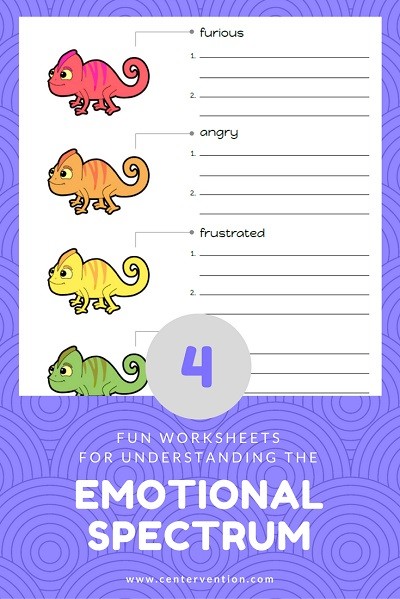
Emotional Spectrum
It’s important that students learn to identify the degree of emotion they are feeling and use words that are more descriptive than mad, sad, happy, etc.
In these worksheets, students will read emotion words that describe the range of one emotion and identify situations that make them feel that way.
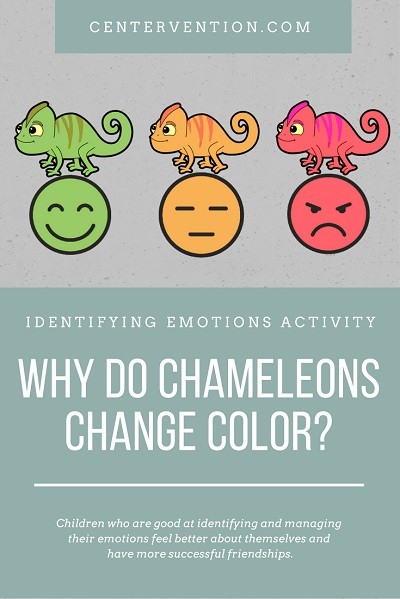
Identifying Emotions Activity
Identifying and managing feelings requires that we respond to emotional situations in a socially acceptable manner, and research shows that children who are good at identifying and managing their emotions feel better about themselves and have more successful friendships.
This identifying emotions activity will students learn to recognize the physical signs associated with different emotions.
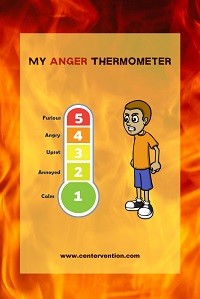
Anger Thermometer
Everyone feels angry from time to time, and it can be an overwhelming emotion. And like other emotions, anger comes in different strengths or degrees.
Using this anger thermometer worksheet, students will reflect on situations where they feel angry and brainstorm ideas for how to calm down.
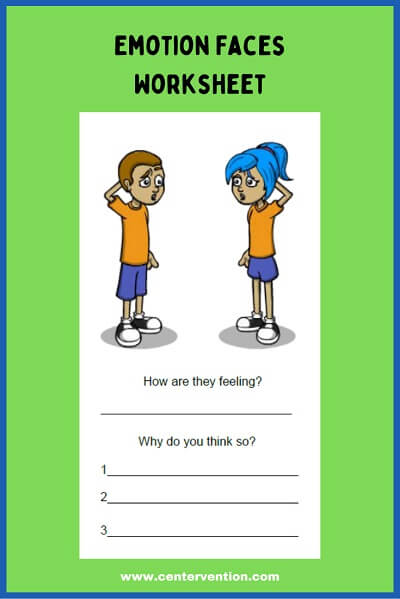
Emotion Faces
These emotion faces worksheets will help your students evaluate facial expressions and associate those expressions with a range of emotions.
In the lesson, we use characters from our online SEL game, Adventures Aboard the SS GRIN to illustrate the following feelings: angry, anxious, bored, confused, happy, impatient, sad, scared, and surprised.
Additional Emotional Literacy Lessons and Activities
- Feelings Wheel: A daily check in to help you understand how your students are feeling
- The Worry Scale: Coping strategies for anxiety, worry, and fear
- Mood Ring Colors: Another worksheet to help students identify emotions
- Feelings Faces: A free match the emojis printable
- Charades: An emotion identification activity based on the game, Charades
- Telephone Game: Recognizing facial expressions and body language
Lesson Extension When Using Centervention Online Programs
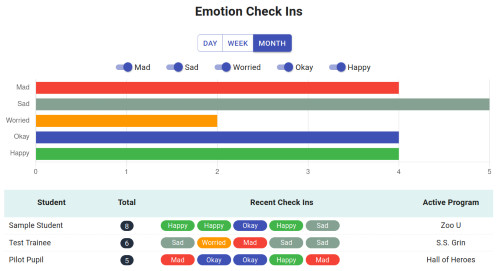
Each day, when a student log in to their online Centervention account, they will be asked how they are feeling. They can select one of the following five options: Mad, Sad, Worried, Okay, Happy.
All of these student emotion check ins are recorded and displayed in your educator dashboard where you can determine, at a glance, which students may need additional support.
And for those students that need additional support, there are 6 scenes in Zoo U and 3 scenes in Zoo Academy that have a primary focus on Emotion Regulation.
Need More No-Prep SEL Lessons?
Join over 30,000 educators who receive our Free SEL lessons each week via email.








